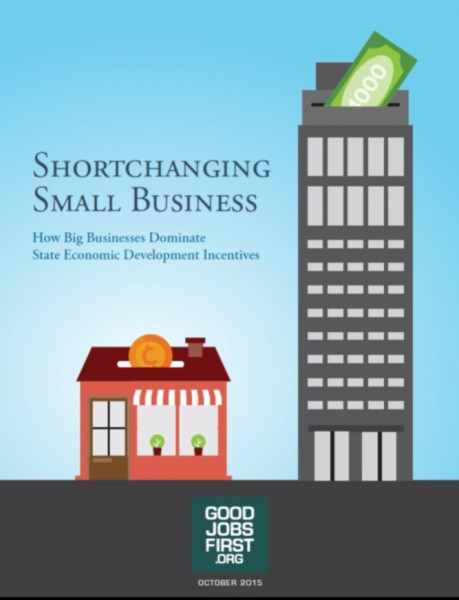Multi-State Analysis Finds Big Businesses Dominate in Receipt of State Financial Incentives
/An analysis of more than 4,200 economic development incentive awards in fourteen states finds that large companies receive dominant shares: 70 percent of the deals and 90 percent of the dollars. The deals, worth more than $3.2 billion, were granted by programs that are facially accessible to both small and large companies. That is the key finding of Shortchanging Small Business, a study released by Good Jobs First and funded by the Kauffman Foundation and the Surdna Foundation.
“State economic development incentive programs—even those that are facially neutral as to company size or have very low qualifying barriers—are profoundly biased against small, local and entrepreneurial businesses,” the report stated. “States, which legally enable and regulate incentives (even those administered by local governments) are failing to walk the talk when it comes to valuing small business job creators.”
The fourteen states where the awards were analyzed are Florida, Indiana, Kansas, Kentucky, Louisiana, Missouri, North Carolina, New Mexico, Nevada, New York, Pennsylvania, Vermont, Virginia and Wisconsin. “Our findings definitively confirm what many small businesspeople have long believed,” said Greg LeRoy, executive director of Good Jobs First and lead author of the study.
Connecticut, which launched a Small Business Express loan and grant program aimed specifically at companies with less than 100 employees, was not among the states analyzed in the study.
Priority for available funding in the Connecticut program is given to those eligible applicants who (1) are creating new jobs and (2) are within Connecticut’s economic base industries, including but not limited to: precision manufacturing, business services, green and sustainable technology, bioscience, and information technology sectors.
From the program launch in January 2012 thru August 2014, published reports indicate that officials at the Department of Economic and Community Development indicated 1,160 businesses have received loans or grants, and have created 4,171 jobs in the state and retained 12,095 existing jobs. At that time, a total of $234 million had been bonded in the program. The average loan was approximately $175,000 per company, with a ceiling of $300,000 for any loan. The total amount of money disbursed was $159.4 million, in three components: $14 million in revolving loans; $83.9 million in job creation loans and $61.4 million in the matching grant program.
In recent years, Connecticut has also provided significant incentives to larger companies that provide assurances of plans to expand operations and jobs. The First Five program offers select companies approved by the Connecticut Department of Economic and Community Development (DECD) a package of incentives for creating at least 200 new full-time jobs. In addition to the incentives for the first 200 jobs within five years, participants continue to get tax credits for each net new job created after that.
Participating companies include Cigna, ESPN, NBC Sports, Alexion, CareCentrix, Deloitte, Bridgewater, Charter Communications, Sustainable Building Systems, Navigators, PitneyBowes and Synchrony Financial, according to published reports.
Earlier this year, it was reported that Consumer financial services company Synchrony Financial, headquartered in Stamford, plans to create 200 to 400 new full-time jobs in Connecticut. The state, through the First Five program, is providing financial support for the expansion project, with the company eligible for grants of up to $20 million based on hiring targets, with a $10 million grant for the first 200 new jobs in Connecticut.
In the Good Jobs First study, there is slight variation in the degree of big-business dominance among the states (80 to 96 percent of the dollars) but that is meaningless, the study authors contend, since the programs vary as do the industrial demographics of the states. The key finding, they stress, is how consistently the programs grossly favor big businesses.
The study, based on a close examination of the recipient companies, designates businesses as large or small based on their employment size as well as their total number of establishments and whether they are locally or independently owned.
“As a policy solution, we do not recommend simply reallocating deals and dollars,” said LeRoy. “These tax-break deals often mean little to small businesses. Instead, states should disqualify big businesses and use the savings to better fund public goods that benefit all employers and help small businesses with the persistent credit crunch.”
Short of disqualifying big businesses, the report recommends states spend much less on big businesses by using safeguards such as dollar caps per deal, dollar caps per job, and dollar caps per company.
Among the programs included in the analysis are the Vermont Employment Growth Incentive (VEGI), New York’s Excelsior Jobs Program, and the Wisconsin Economic Development Tax Credit.































